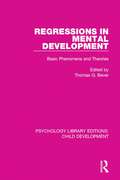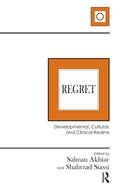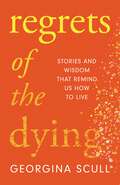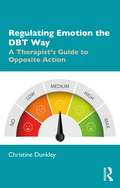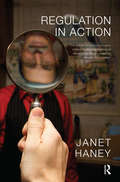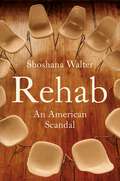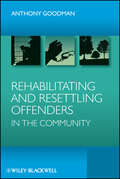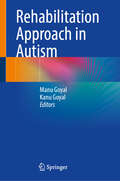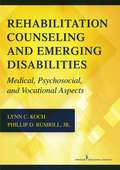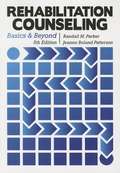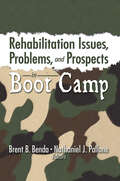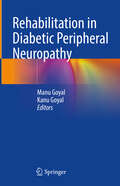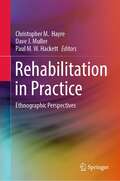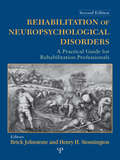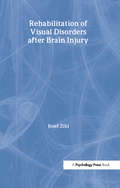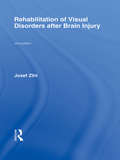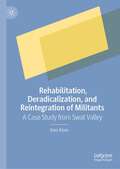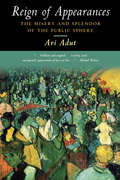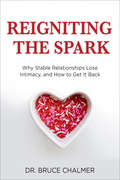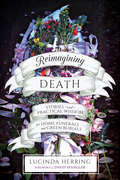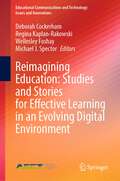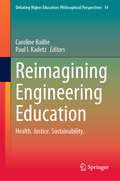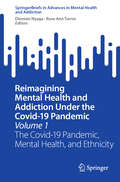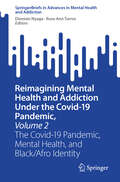- Table View
- List View
Regressions in Mental Development: Basic Phenomena and Theories (Psychology Library Editions: Child Development #1)
by Thomas G. BeverScience depends on noticing that things which seem identical are different, and conversely. In psychology, one cannot assume that apparently identical behaviours are due to identical mechanisms. The work reported in this book involves the problem of classifying the true nature of behaviour as it appears during child development. Originally published in 1982, the papers in this volume attempt to interpret, explain, or explain away developmental regressions in a variety of different areas. In spring 1975, a group of scholars interested in such problems met for several days to discuss their individual findings and the underlying theoretical issues. This volume reflects both the discussions at the original conference and succeeding years of thinking, reading and writing.
Regret: Developmental, Cultural, and Clinical Realms
by Suzanne Kaplan Tomas BühmThis book is devoted to the developmental substrate of regret and of its vicissitudes over the life span. It deals with fiction, poetry, and movies pertaining to regret. The book elucidates the psychopathological dimension of ego restriction associated with regret.
Regrets of the Dying: Stories and Wisdom That Remind Us How to Live
by Georgina Scull'A beautiful and moving reminder to appreciate life' Roxie Nafousi, author of Manifest'This book may on first glance appear to be about death and regrets, but is in reality about life and choices. It is warmly life-affirming ... A magnificent read that will inspire. I loved it' Sue Black 'So beautiful ... Perfectly written and judged ... A wonderful book that made me grasp life a little more firmly' Dr Chris van Tulleken A powerful, moving and hopeful book exploring what people regret most when they are dying and how this can help us lead a better life. If you were told you were going to die tomorrow, what would you regret?Ten years ago, without time to think or prepare, Georgina Scull ruptured internally. The doctors told her she could have died and, as Georgina recovered, she began to consider the life she had led and what she would have left behind.Paralysed by a fear of wasting what seemed like precious time but also fully ready to learn how to spend her second chance, Georgina set out to meet others who had faced their own mortality or had the end in sight.
Regrets of the Dying: Stories and Wisdom That Remind Us How to Live
by Georgina Scull'A beautiful and moving reminder to appreciate life' Roxie Nafousi, author of Manifest'This book may on first glance appear to be about death and regrets, but is in reality about life and choices. It is warmly life-affirming ... A magnificent read that will inspire. I loved it' Sue Black 'So beautiful ... Perfectly written and judged ... A wonderful book that made me grasp life a little more firmly' Dr Chris van Tulleken A powerful, moving and hopeful book exploring what people regret most when they are dying and how this can help us lead a better life. If you were told you were going to die tomorrow, what would you regret?Ten years ago, without time to think or prepare, Georgina Scull ruptured internally. The doctors told her she could have died and, as Georgina recovered, she began to consider the life she had led and what she would have left behind.Paralysed by a fear of wasting what seemed like precious time but also fully ready to learn how to spend her second chance, Georgina set out to meet others who had faced their own mortality or had the end in sight.
Regulating Emotion the DBT Way: A Therapist's Guide to Opposite Action
by Christine DunkleyRegulating Emotion the DBT Way is a practical guide to the DBT skill of ‘Opposite Action’, which helps clients develop the skill of up- or down-regulating their emotions when necessary. It is the skill that fosters emotional literacy in clients who have learned to fear or avoid painful feelings. Part A of the text introduces emotion theory, describes how to validate emotions, and explains how Linehan’s ‘Opposite Action’ skill is used to regulate problematic responses. There are examples and analogies that can be shared with clients, and clinical examples to demonstrate the key points. There is a description of how DBT therapists contextualise emotion using chain analysis. Part B dedicates a chapter to each of the basic emotions and describes its signature features. A session scenario is included allowing the reader to see how the therapist coaches the skill of opposite action, elicits behavioural rehearsal, and gives corrective feedback. There are some tips on handling common issues specific to that emotion, based on the author’s extensive experience. This book will be of interest to any therapist who wants to learn more about a behavioural approach to emotion such as psychologists, nurses, social workers, psychiatrists, counsellors, cognitive therapists, prison staff, and occupational therapists. It is an accessible explanation of emotion regulation for people who have already undertaken DBT training.
Regulation in Action: The Health Professions Council Fitness to Practise Hearing of Dr Malcolm Cross - Analysis, History, and Comment
by Janet HaneyThis incisive study shows that "regulation", against which many have warned but which some psychotherapists still imagine to be a solution to all their ills, is actually already here. The author traces her way through this apparatus, and makes a compelling case for taking the HPC seriously as a machine that incarnates the very kind of unhealthy practice it pretends to set itself against.'- Professor Ian Parker, Manchester Metropolitan University'. If you want to know about the reality of state regulation, how it works in practice - as opposed to what people say about it - you should read this book. A shocking and unsettling account.'- Paul Gordon, author of The Hope of Therapy and former chair of the Philadelphia Association'. Do not let the simplicity of this lucid account of a difficult problem deceive you. 'This book investigates the claim that regulation by agencies of State is one of the prerequisites for improving professional practice. It displays how the underlying administrative interests of such bureaucracies are detrimental to the structure of professional communities.
Rehab: An American Scandal
by Shoshana WalterPulitzer finalist Shoshana Walter exposes the country&’s failed response to the opioid crisis, and the malfeasance, corruption, and snake oil which blight the drug rehabilitation industry.Our country&’s leaders all seem to agree: People who suffer from addiction need treatment. Today, more people have access to treatment than ever before. So why isn&’t it working? The answer is that in America—where anyone can get addicted—only certain people get a real chance to recover. Despite record numbers of overdose deaths, our default response is still to punish, while rehabs across the United States fail to incorporate scientifically proven strategies and exploit patients. We&’ve heard a great deal about the opioid crisis foisted on America by Big Pharma, but we&’ve heard too little about the other half of this epidemic—the reason why so many remain mired in addiction. Until now. In this book, you&’ll find the stories of four people who represent the failures of the rehab-industrial complex, and the ways our treatment system often prevents recovery. April is a black mom in Philadelphia, who witnessed firsthand how the government&’s punitive response to the crack epidemic impeded her own mother&’s recovery—and then her own. Chris, a young middle-class white man from Louisiana, received more opportunities in his addiction than April, including the chance to go to treatment instead of prison. Yet the only program the judge permitted was one that forced him to perform unpaid back-breaking labor at for-profit companies. Wendy is a mother from a wealthy suburb of Los Angeles, whose son died in a sober living home. She began investigating for-profit treatment programs—yet law enforcement and regulators routinely ignored her warnings, allowing rehab patients to die, again and again. Larry is a surgeon who himself struggled with addiction, who would eventually become one of the first Suboxone prescribers in the nation, drawing the scrutiny of the Drug Enforcement Administration. Together, these four stories illustrate the pitfalls of a system that not only fails to meet the needs of people with addiction, but actively benefits from maintaining their lower status. They also offer insight into how we might fix that system and save lives.
Rehabilitating and Resettling Offenders in the Community
by Anthony H. GoodmanRehabilitating and Resettling Offenders in the Community is a significant examination of the historical development of work with offenders and their treatment by the state and society. It offers unique perspectives and a wealth of information drawn from numerous interviews with probation staff. Highlights how the work of probation staff has changed over time and the reasons behind these changes Includes discourse with probation staff carried out over many years for a comprehensive, 'insiders' view of the situation Focuses on contemporary issues, including the changes brought in by the Conservative/Liberal Democrat coalition Written by a leading academic with extensive experience in the probation service
Rehabilitation Approach in Autism
by Manu Goyal Kanu GoyalThe book introduces a pioneering approach to the comprehensive care of individuals with autism spectrum disorder (ASD), emphasizing its multidisciplinary nature, evidence-based foundation, and innovative treatments. It addresses a critical gap in current literature by highlighting the collaborative roles of diverse healthcare professionals, such as pediatricians, physiotherapists, occupational therapists, speech therapists, and nurses, in the rehabilitation and treatment of ASD. The manual intervention strategies advocated by physiotherapists aim to enhance motor skills and cognitive processes through interactive and playful methods, fostering social integration and independence among patients. The book emphasizes evidence-based practices across disciplines, ensuring that all healthcare professionals receive essential, up-to-date knowledge pertinent to their roles in Autism Spectrum Disorder care. Moreover, it explores recent advancements in treatment approaches, providing readers with insights into innovative therapies and methodologies. This multidisciplinary approach consolidates fragmented knowledge into a single resource, equipping healthcare professionals with the necessary tools to deliver effective and holistic care to individuals with ASD. The targeted audience for the book includes pediatricians, physiotherapists, occupational therapists, speech therapists, and nurses.
Rehabilitation Counseling And Emerging Disabilities: Medical, Psychosocial, And Vocational Aspects Of Emerging Disabilities For Rehabilitation Counselors
by Phillip D. Rumrill Lynn C. KochEmerging disabilities are disabling conditions that are new to medical science, often medically debated, and lacking in known etiology; or those increasing in prevalence in recent years. This master's-level text is the first to eschew traditional disabilities to focus specifically on the unique characteristics and needs of individuals with disabilities such as multiple chemical sensitivity, fibromyalgia, and Lyme disease, or those currently increasing in prevalence (e. g. , diabetes, autism, PTSD), and explore their implications for rehabilitation counseling practice. The text is also unique in its examination of how disability causes, types, and patterns are changing in response to current medical, social, cultural, and environmental trends and addressing necessary changes to rehabilitation policies and practices to better serve consumers with emerging disabilities. The book explores important sociological and environmental phenomena such as global warming, pollution, poverty, violence, migration patterns, addiction, and substance abuse, and the changing age demographic of the United States that has altered the landscape of disability policy and rehabilitation services in the 21st century. Each chapter provides specific examples of disabling conditions and discusses their medical, psychosocial, and vocational significance. The authors examine implications for rehabilitation assessment, planning, and placement, and emphasize changes needed to rehabilitation policy and practice. The text is replete with practical evidence-based strategies for meeting the psychosocial and vocational needs of people with emerging disabilities. Chapters include case examples, learning objectives, and discussion questions.
Rehabilitation Counseling: Basics And Beyond
by Randall M. Parker Jeanne Boland PattersonThe purpose of this text is to provide both a basic foundation for students beginning their journey into the profession of rehabilitation counseling and a broad-based reference for current practitioners. The contents provide a conceptual overview of the profession, history, theory, research, and applied foundations of rehabilitation counseling.
Rehabilitation Issues, Problems, and Prospects in Boot Camp
by Brent BendaBoot camps-what are their effects on criminal behavior?Public and political support for boot camps as alternative correctional facilities has rarely faltered since their inception decades ago, though their efficacy remains uncertain. Rehabilitation Issues, Problems, and Prospects in Boot Camp explores all facets of the controversial issue, from the attitudes and perceptions of the public, to the political motivations in maintaining them, on to the latest research on the camps and their graduates. Respected authorities discuss boot camps&’ effectiveness on diverse groups according to age, gender, race, and correctional facility. Cost factors between boot camps and other correctional institutions are compared, along with the latest criminal recidivism data. Boot camps provide inmates with an uncomfortable, paramilitary-style environment with an eye toward shorter incarceration time, lower costs, and more positive effects on criminal behavior. Does this correctional model work as anticipated? Rehabilitation Issues, Problems, and Prospects in Boot Camp gives you the facts, revealing the public and political arguments for and against boot camps as well as the research on the theoretical predictors of criminal recidivism and the differing attitudes of attendees toward the facilities according to gender and race. Critical policy issues are identified and discussed in-depth, with particular emphasis given to the positive and negative aspects of rehabilitation possibilities of boot camps. Helpful tables clearly illustrate statistics while extensive references provide opportunities for further insight.Rehabilitation Issues, Problems, and Prospects in Boot Camp explores questions such as: criminal recidivism-what are the theoretical predictors? what effect does gender have on criminal recidivism? what is the effect of this hypermasculine paramilitary prison environment have on males- and females? what are the differences between Native American and non-Native American perceptions of boot camp? is the perceived severity of boot camp different for gender? what is the process for policymaking in creating and maintaining boot camps? what role does politics play in the continuation of boot camps? what corrections to boot camp facilities should be made based upon evidence and research?Rehabilitation Issues, Problems, and Prospects in Boot Camp is a thorough examination of the social and political issues about boot camps that makes essential reading for educators, students, sociologists, criminologists, psychologists, counselors, and criminal justice professionals.
Rehabilitation in Diabetic Peripheral Neuropathy
by Manu Goyal Kanu GoyalThis book on Rehabilitation in Diabetes Peripheral Neuropathy offers an update on the recent advancement in assessment methods and comprehensive rehabilitation. The book comprises ten chapters with different titles, ranging from medical knowledge of Diabetes Peripheral Neuropathy and its improvement in the assessment methods to the importance and role of non-pharmacological interventions to improve the quality of life in such patients. The role of nutrition, orthotics, and the incite into diabetic foot will be the additional topics in the book. By reading this book, the reader will be confident in assessing and managing this chronic complication of diabetes mellitus in a more informative and elaborative manner and will contribute towards preventing the development of the diabetic foot, followed by ulcers in later stages and amputation. This book will enhance the clinical practice of practitioners in dealing with DPN.
Rehabilitation in Practice: Ethnographic Perspectives
by Paul M. W. Hackett Christopher M. Hayre Dave J. MullerThis book focuses on developing the use of ethnographic research for rehabilitation practitioners by recognizing its value methodologically and empirically in the field of rehabilitation. The very nature of ethnographic research offers an array of opportunities for researchers to understand the social world around them. The book identifies the multifaceted use of ethnographic methods in the rehabilitation setting. It touches on how acute and chronic conditions can affect the nature of ethnographic work in attempts to offer originality in a range of rehabilitation settings. Readers will find this collection of examples useful for informing their own research, and it aims to enlighten new discussion and arguments regarding both methodological and empirical use of ethnographic work internationally.
Rehabilitation of Neuropsychological Disorders: A Practical Guide for Rehabilitation Professionals
by Brick Johnstone Henry H. StonningtonMany contemporary neuropsychology texts focus on neuropathology, the description of specific tests, and the differential diagnosis of central nervous system disorders. However, increasingly sophisticated neuroradiological techniques, managed care factors, and the growth of rehabilitation necessitates that rehabilitation professionals provide more functionally (versus diagnostically) useful evaluations to improve the neuropsychological functioning and community integration of persons with brain injuries or diseases. This book aims to fill this gap and to provide an overview of standard neuropsychological treatment strategies for specific cognitive impairments that are identified on testing. The new edition enhances this goal with three chapters outlining important recommendations, services, and issues for rehabilitation professionals. Written by a team of experienced scientists and professionals, the volume provides a universal taxonomy of neuropsychological abilities (emphasizing relatively simple terms), with a list of basic rehabilitation strategies to improve impairments identified in general cognitive domains. Specific chapters are included on the neuropsychological remediation of memory, attention, language, visual-spatial skills, and executive function impairments. Each chapter proposes a taxonomy of relatively unitary cognitive constructs (e.g., divided attention, sustained attention, focused attention), lists tests which may be used to assess each cognitive construct, and provides specific rehabilitation strategies to improve or accommodate the identified neuropsychological impairments. The final chapters cover basic resources and issues of which the rehabilitation professional needs to be aware (vocational rehabilitation, disability determination, and guardianship issues). This new edition provides a wealth of useful information for family members, rehabilitation professionals, and others who work with persons with brain injury in improving the community functioning for those with brain dysfunction. An accompanying website facilitates access to the resources and strategies from the book, allowing the practitioner to cut and paste these recommendations into their clinical reports.
Rehabilitation of Visual Disorders After Brain Injury: 2nd Edition (Neuropsychological Rehabilitation: A Modular Handbook Ser.)
by Josef ZihlDespite a long research tradition in visual neuroscience, the rehabilitation of cerebral visual deficits has, until recently, been neglected. This book is the first to report systematic observations on spontaneous recovery of cerebral visual deficits after acquired brain injury, and the outcome of treating these deficits. The whole range of human visual functions and capacities is covered: visual field, visual acuity and contrast sensitivity, visual adaptation, colour vision, visual space perception, and visual cognition. Additionally, there is a special section devoted to patients with central scotoma. All treatment procedures described are empirically founded.
Rehabilitation of Visual Disorders After Brain Injury: 2nd Edition (Neuropsychological Rehabilitation: A Modular Handbook)
by Josef ZihlThis thoroughly updated and extended edition covers the various cerebral visual disorders acquired after brain injury, as well as the rehabilitation techniques used to treat them. These are described within a brain plasticity framework, using data from single and group case studies along with follow up observation data. This original, tailor-made approach also includes the recording of eye movements for assessing scanning performance in scene perception and reading. The book gives a brief synopsis of the historical background on the subject, alongside an outline of intervention designs and methodological difficulties in the field, and goes on to discuss the mechanisms and processes that provide the foundations for recovery of function and successful adaptation in visually impaired patients. The author concludes by analyzing the importance of the procedures and outcomes of treatments to the reduction of patients’ visual handicaps. The new edition also contains an appendix with recommendations on the case histories, diagnostics and treatments. It is ideal reading for students in clinical neuropsychology, as well as professionals in the fields of neurology, visual neuroscience and rehabilitation experts.
Rehabilitation, Deradicalization, and Reintegration of Militants: A Case Study from Swat Valley
by Ilam KhanThis ethnographic study focuses on post-conflict rehabilitation in Pakistan's Swat valley, addressing deradicalization, rehabilitation and reintegration in the context of militancy and counter-militancy. It provides a theoretical framework for rehabilitation, emphasizing disarmament, demobilization, and reintegration (DDR) and introduces the concepts of controlled environment, controlled society, and controlled rehabilitation within Swat's unique context. The book categorizes the drivers of militancy, revealing distinctions from conventional perspectives. It also assesses the challenges of reintegrating ex-combatants and explores the compatibility of restorative justice (RJ) with Pashtunwali, the traditional Pashtun legal system. The book is useful for researchers focusing Pashtun region, post-conflict interventionists, and peace and conflict scholars, this book offers valuable insights into the intricacies of this critical region's rehabilitation and counter-militancy efforts.
Reign of Appearances: The Misery And Splendor Of The Public Sphere
by Ari AdutThe public sphere, be it the Greek agora or the New York Times op-ed page, is the realm of appearances - not citizenship. Its central event is spectacle - not dialogue. <P><P>Public dialogue, the mantra of many intellectuals and political commentators, is but a contradiction in terms. Marked by an asymmetry between the few who act and the many who watch, the public sphere can undermine liberal democracy, law, and morality. Inauthenticity, superficiality, and objectification are the very essence of the public sphere. But the public sphere also liberates us from the bondages of private life and fosters an existentially vital aesthetic experience. <P>Reign of Appearances uses a variety of cases to reveal the logic of the public sphere, including homosexuality in Victorian England, the 2008 crash, antisemitism in Europe, confidence in American presidents, communications in social media, special prosecutor investigations, the visibility of African-Americans, violence during the French Revolution, the Islamic veil, and contemporary sexual politics. <P>This unconventional account of the public sphere is critical reading for anyone who wants to understand the effects of visibility in urban life, politics, and the media.<P>Challenges the common wisdom that the public sphere is always good for democracy.<P> Asserts that spectatorship - and not civic participation - is the essence of the public sphere.<P> Argues that spectatorship, which is a much-disdained stance, is an existentially vital aesthetic experience.
Reigniting the Spark: Why Stable Relationships Lose Intimacy, and How to Get It Back
by Bruce ChalmerLearn how to have better sex with your partner and build a lasting, satisfying relationship in this guide by a seasoned couples therapist.Dr. Bruce Chalmer’s Reigniting the Spark shows couples how to build a lasting relationship full of passion and fulfillment. You’ll find out how to improve your communication, have better sex, and avoid pointless arguments.Dr. Chalmer combines his expertise in science with thirty years of experience as a couples therapist to show how you can restore intimacy and overcome any relationship problem to create and maintain a lively, loving, lasting relationship. He offers a unique perspective on the role of faith—not necessarily religious—in relationships. Whatever your faith background, religious or secular, Dr. Chalmer’s approach to faith as a key to unlocking intimacy will inform and inspire you. This book explores the most common issues that sap the happiness out of a relationship and shows you exactly what to do to turn it around. Written in a relatable and easy-to-understand style, Reigniting the Spark will help you better understand yourself and your partner so you can both be more satisfied. Whether you’re reading alone or with a partner, this book will teach you:How to build and restore intimacy, trust, and a deep connection in your relationshipHow to identify triggering issues like trauma that could be sapping the joy out of your relationship, and exactly what to do about itA list of bad reasons people get married—and one good oneHow to go from plain old sex, to good sex, to sacred sexHow to be your best self when your partner has been unfaithfulHow to know when to break up, and when to work through the inevitable growing pains in your relationshipReigniting the Spark is for any couple who’s ready to create a stronger, more fulfilling relationship. Perfect for fans of The Seven Principles for Making Marriage Work by Jon Gottman and Nan Silver, Kosher Sex by Shmuley Boteach, Mating in Captivity by Esther Perel, The 5 Love Languages by Gary Chapman, and Getting the Love You Want by Harville Hendricks and Helen LaKelly Hunt.
Reimagining Death: Stories and Practical Wisdom for Home Funerals and Green Burials
by David Spangler Lucinda HerringHonor your loved ones and the earth by choosing practical, spiritual, and eco-friendly after-death careNatural, legal, and innovative after-death care options are transforming the paradigm of the existing funeral industry, helping families and communities recover their instinctive capacity to care for a loved one after death and do so in creative and healing ways. Reimagining Death offers stories and guidance for home funeral vigils, advance after-death care directives, green burials, and conscious dying. When we bring art and beauty, meaningful ritual, and joy to ease our loss and sorrow, we are greening the gateway of death and returning home to ourselves, to the wisdom of our bodies, and to the earth.
Reimagining Education: Studies and Stories for Effective Learning in an Evolving Digital Environment (Educational Communications and Technology: Issues and Innovations)
by Deborah Cockerham Michael J. Spector Regina Kaplan-Rakowski Wellesley FoshayTechnology has developed at a tremendous rate since the turn of the century, but educational practice has not kept pace. Traditional teaching practices still predominate in many educational settings, and educators are often intimidated by new technology. However, as tragic as the COVID-19 pandemic has been, it has caused many people to rethink education and opportunities provided by new technologies for effective teaching and learning. How can educational communities of practice be reimagined to support a growth mindset for learning? This volume explores innovative visions for 21st century learning. The content explores the experiences of teachers with new technology, presents research studies that highlight effective strategies and technologies, and shares lessons learned from a unique researcher-practitioner mentoring model. Educational approaches that worked well, challenges that were difficult to overcome, and potential benefits of effective technology integration will encourage readers to reimagine education and implement practices that can strengthen the future of online education.
Reimagining Engineering Education: Health. Justice. Sustainability. (Debating Higher Education: Philosophical Perspectives #14)
by Caroline Baillie Paul I. KadetzThis book considers a radical change to engineering education. It argues for a reexamination of the traditional way in which engineering students are educated in disciplinary silos and how, instead, we might re-imagine their professional education to more appropriately prepare students to design innovative solutions to increasingly complex global challenges. It poses the question: “How can engineers think outside the engineers’ box?". A box that has over generations rendered engineers to be unquestioning servants of the socio-political systems in which they function. The book introduces a unique framework and language for engineering education which considers both the problems of the past and present, and the potential solutions offered for the future. By reaching out beyond the bounds of traditional knowledge and thought collectives, this book will also offer a pathway for other professional education programs to explore.
Reimagining Mental Health and Addiction Under the Covid-19 Pandemic, Volume 1: The Covid-19 Pandemic, Mental Health, and Ethnicity (Advances in Mental Health and Addiction)
by Dionisio Nyaga Rose Ann TorresThis edited collection is a follow-up to Algoma University's inaugural conference on mental health and addiction held at the Brampton campus in Ontario, Canada. We live in a society where many marginalized communities continue to bear a historically disproportionate burden on their psychological, mental, and economic well-being, especially under the Covid-19 pandemic. Covid-19 has had a continuing impact on marginalized and racialized communities at all levels. We are now witnessing the compounded effects in the form of a worsening mental health and addiction crisis and its subsequent impact on children's education, service delivery, and overall psychosocial well-being.Covid-19 has widened the gap and increased poverty disparities between high-income and low-income individuals. Furthermore, it has affected the psychosocial resilience of people. As communities of scholars, practitioners, and researchers, we have a responsibility to address these existential issues in ways that are ethical and transformative. This type of engagement should help mitigate the consequences of the pandemic in an intersectional manner. These conversations should assist us in understanding and addressing the trauma and suffering that marginalized communities and individuals continue to endure. Together, we can work to find answers to mental health and addiction challenges, while valuing people's histories and realities within this intersectional engagement.This book aims to redefine psychiatric discourse in the age of the pandemic and encourage us to imagine how the world can be reformed in ways that are both ethical and political. It has the potential to shed light on the values and realities of communities in discussions of medical sociology, particularly concerning the impact of Covid-19 on marginalized communities.This book is structured into three volumes. Volume one delves into the repercussions of the COVID-19 pandemic on the mental health of various ethnic groups. Volume two specifically addresses the impact of the pandemic on the mental health of Afro-Black individuals. Volume three explores the connections between the COVID-19 pandemic, psychological well-being, and colonialism.
Reimagining Mental Health and Addiction Under the Covid-19 Pandemic, Volume 2: The Covid-19 Pandemic, Mental Health, and Black/Afro Identity (Advances in Mental Health and Addiction)
by Dionisio Nyaga Rose Ann TorresThis edited collection is a follow-up to Algoma University's inaugural conference on mental health and addiction held at the Brampton campus in Ontario, Canada. We live in a society where many marginalized communities continue to bear a historically disproportionate burden on their psychological, mental, and economic well-being, especially under the Covid-19 pandemic. Covid-19 has had a continuing impact on marginalized and racialized communities at all levels. We are now witnessing the compounded effects in the form of a worsening mental health and addiction crisis and its subsequent impact on children's education, service delivery, and overall psychosocial well-being. Covid-19 has widened the gap and increased poverty disparities between high-income and low-income individuals. Furthermore, it has affected the psychosocial resilience of people. As communities of scholars, practitioners, and researchers, we have a responsibility to address these existential issues in ways that are ethical and transformative. This type of engagement should help mitigate the consequences of the pandemic in an intersectional manner. These conversations should assist us in understanding and addressing the trauma and suffering that marginalized communities and individuals continue to endure. Together, we can work to find answers to mental health and addiction challenges, while valuing people's histories and realities within this intersectional engagement. This book aims to redefine psychiatric discourse in the age of the pandemic and encourage us to imagine how the world can be reformed in ways that are both ethical and political. It has the potential to shed light on the values and realities of communities in discussions of medical sociology, particularly concerning the impact of Covid-19 on marginalized communities. This book is structured into three volumes. Volume one delves into the repercussions of the COVID-19 pandemic on the mental health of various ethnic groups. Volume two specifically addresses the impact of the pandemic on the mental health of Afro-Black individuals. Volume three explores the connections between the COVID-19 pandemic, psychological well-being, and colonialism.
